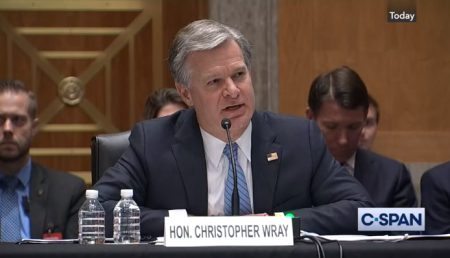'Alarming uptick' in juvenile violence may be linked to COVID-19 school closures: FBI director

Young people kept out of the classroom during the COVID-19 pandemic and those who have yet to return could be a factor fueling a juvenile crime spree across the United States, according to one of the nation's top law enforcement officials.
FBI Director Christopher A. Wray told the Senate Homeland Security and Governmental Affairs Committee Thursday of what he described as "an alarming uptick in the incidence of juveniles engaging in violence, often graduating from carjackings to even worse violence."
Juveniles who have not returned to school after pandemic restrictions were lifted "may contribute" to an overall rise in violent crime in some states during and after 2020, the Trump-appointed Wray said during the hearing on security threats.
More than 50 violent crime arrests every day this summer were tallied by the FBI, Wray said, many of whom were young offenders.
"This is a real challenge for the legal system because we're not set up to very effectively deal with crimes committed by minors," he added.
Wray said violent criminals who still have access to a cell phone while serving a sentence can "continue to participate in the activity, despite best efforts by correction officials."
A report from the Major Cities Chiefs Association released in early November surveyed 70 cities and found while homicide and rape numbers are down slightly in 2022, robbery and aggravated assault have jumped to over 359,000 incidents between Jan. 1 and Sept. 30, an increase of around 13,000 from the previous year.
According to data from the U.S. Department of Justice, violent crime among juveniles was on a steady decline, with youth arrests on violent crime charges plunging from 140,000 in the mid-1990s to just under 40,000 in 2020.
Wray also said lenient "bail practices" and other policies from prosecutors in some cities allow criminals to creep back onto the streets and potentially harm residents.
While the FBI director did not call out specific cities by name, district attorneys in New York, Los Angeles and other big-city jurisdictions have drawn criticism for their failure to pursue criminal charges in traditionally prosecuted crimes.
While the FBI relies on shared data from local police departments to inform its data, roughly four in 10 police departments, including the NYPD, declined to submit data to the bureau this year.
One factor in the trend stems from a new reporting system, which requests more detailed information on each crime than in previous years.
Wray discussed other topics during the hearing besides juvenile violence. One senator asked Wray to respond to claims from pro-life organizations that the FBI isn't doing enough to investigate nationwide acts of violence and vandalism against pro-life organizations following the U.S. Supreme Court's abortion decision in June.
The director assured the FBI has "quite a number of investigations … into attacks or threats against pregnancy resource centers, faith-based organizations and other pro-life organizations."
"And you might be interested to know that since the Dobbs ... decision, probably in the neighborhood of 70% of our abortion-related violence cases or threats cases are cases of violence or threats against ... pro-life organizations and we are going after that through our taskforces, through our criminal authorities."
About 20 field offices are involved in that effort, Wray said.
Wray assured the FBI is "equal opportunity" when prosecuting criminal conduct.
"My view is expressed to all of our people including in the context of abortion-related violence is that I do not care what side of the issue you are on, you do not get to engage in violence," he said.
"We are equal opportunity when it comes to that."
Ian M. Giatti is a reporter for The Christian Post. He can be reached at: ian.giatti@christianpost.com.





















